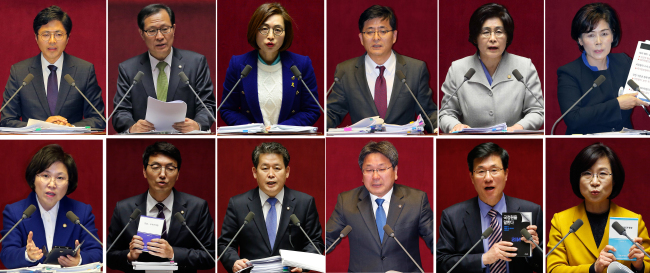With legislative standoff persisting over the disputed counterterrorism bill, opposition lawmakers staging filibuster continued to make headlines on Friday for poignant speeches that resonated with their supporters.
The unlimited speech relay serves as a rare opportunity to make their case before the national audience, particularly for political rookies and those excluded from their parties’ nomination list for the April general elections.
Among them was Rep. Kim Hyun of The Minjoo Party of Korea, a first-term proportional representative who has recently been screened out of the party’s nomination.
“We have to take out the toxic clause from the antiterrorism bill that may enable the National Intelligence Service to abuse its power,” said Kim, referring to the allegation that the nation’s top intelligence agency had deliberately interfered with the 2012 presidential election.
 |
| Photos of opposition lawmakers staging filibuster at the National Assembly. Yonhap |
The Minjoo Party rebuked the bill as a measure that would curtail civil liberty by expanding the spy agency’s surveillance authority, but the government and the ruling Saenuri Party countered that the bill is crucial to national security and that it included sufficient provisions to prevent such power abuse.
Kim’s remark followed Rep. Seo Gi-ho, another first-termer of the progressive minority Justice Party. After his five-hour speech, the former judge announced that he would give up candidacy in the upcoming elections.
Rep. Shin Kyoung-min, another Minjoo first-termer and former news anchor, made headlines by pointing out that the ruling Saenuri Party, despite its grudges against the ongoing filibuster, had endorsed the system in the first place back in 2012.
The Minjoo Party’s third-term lawmaker Rep. Kang Gi-jung, who is expected to be excluded from the party’s nomination for the parliamentary race, was noticed for his emotional outburst during his four-hour speech late Thursday.
“Had I been given an opportunity to discuss freely at the National Assembly, I would not have gone down in history as a violent lawmaker,” said Kang, referring to his past record of using violence against a fellow lawmaker amid attempts to deter the ruling party’s enforcement of a bill passage.
Meanwhile, the partisan confrontation over the much-disputed bill showed no signs of abating, both inside and outside parliament. While the opposition bloc set up a placard to support the filibuster at the entrance to the Assembly hall, the Saenuri members held their own signs to protest against it.
Civic groups, too, held their ideological battle outside the legislature building. The People’s Solidarity for Participatory Democracy, the nation’s leading progressive civic group, has been conducting a campaign since Tuesday to allow citizens to speak out against the bill.
Next to what the left-leaning group calls an “online filibuster,” a conservative group staged its counter protest against the filibuster, urging lawmakers to pass the antiterrorism bill that they claim is crucial to national security.
By Yeo Jun-suk (jasonyeo@heraldcorp.com)

